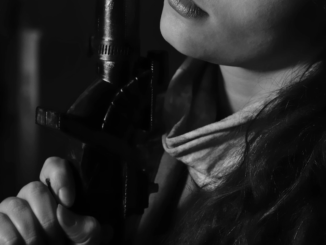As a kid I spent most of my Summer holidays at my Grandparent’s house in Hull. Dad came to London during the war when he was posted to the Royal Army Pay Corp offices in Moorgate. Being blind in one eye from childhood measles, he was not fit for active service but volunteered anyway. As a trained accountant the army did something unusual and actually made use of his “head for figures” and put him in a position where he could use his talents. It was while working there that he met and married my Mother. At the end of the war, Dad could have gone back to his accounting job in Hull but decided to stay in London and got a job with a firm of bookmakers in the West End.
As a young child, my Dad’s parents came to stay with us every Christmas and Easter and we went to stay with them in Hull for two weeks every Summer. The journey to Hull was all part of the holiday because we went by train. We are talking 1950’s and in those pre-Beeching days a steam-hauled trip was a real treat. A week or so before we travelled Mum would arrange the British Rail “Luggage in Advance” service to pick up a big trunk. Mum start putting clothes out what seemed ages before travelling day and carefully packing. She then had a sort of sacking cover for the trunk that she sewed it into. The BR lorry would pick up the trunk and it was delivered to Grandma’s so it was there when we arrived.
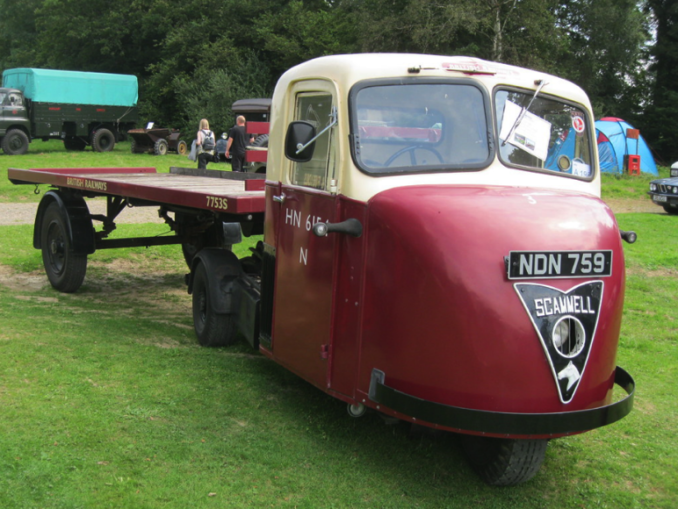
Scammell Mechanical Horse, Andrew Bone – Licence CC BY-SA 2.0
We invariably travelled on the Friday evening, after school had broken up for the Summer holidays. The Yorkshire Pullman used to leave King’s Cross for Bradford and at 17:40 with 3 or 4 of the chocolate and cream carriages forming the Hull Pullman detached at Doncaster for Hull Paragon. Dad would arrange for an old wartime colleague who ran a hired car business to pick up Mum, my older brother and myself and take us to King’s Cross style in one of his Bentleys. Dad used to meet us at the station straight from his office. We had seat reservations and settled in for a “posh” meal served at our table by white-gloved waiters. It was what is known today as “Silver Service” and the waiters were really skilled to pull that off on a rocking and rolling carriage. From memory, in those days the train stopped at Retford, Doncaster, Goole, Brough and Hull.
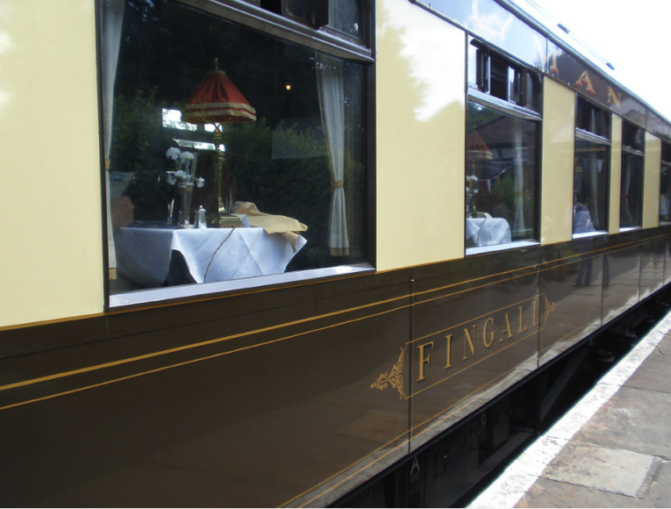
Fingall, Amanda Slater – Licence CC BY-SA 2.0
It always seemed to be getting dark as the train arrived in Hull and we then had another treat, a taxi ride up Beverley Road to Fountain Road. My grandparents lived in a terraced house on Fountain Road at the end near Beverley Road. The old Hull Royal Infirmary, previously the site of the Sculcoates Workhouse was just behind the terrace houses on the other side of the road. When I think about it now, the houses on Fountain road were what would be considered slums in this day and age but were actually quite solid and not damp. However, if you think about Coronation Street then you get the idea of what they were like. The front door opened directly on to the street and was only locked when my grandparents went to bed at night. Grandma used to yellow stone the front doorstep as part of her daily routine. The neighbours all competed to keep the few yards in front of their homes neat and tidy with some yellow stoned steps and some red stoned steps.
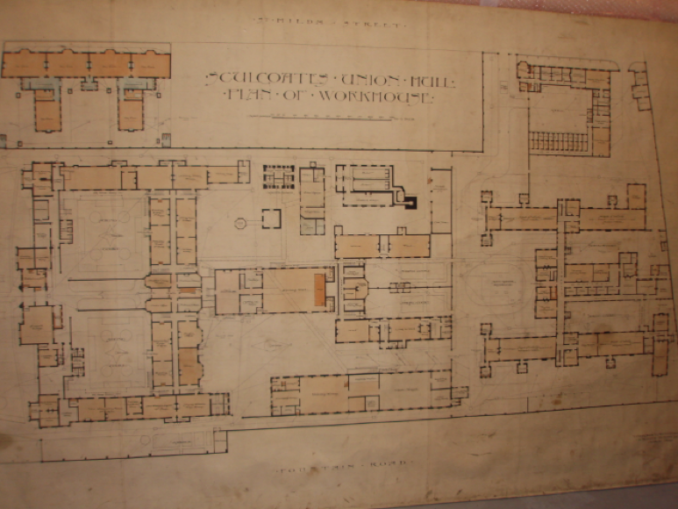
Sculcoates Workhouse Plan, Rathfelder – Licence CC BY-SA 4.0
The front door opened into a hallway which ran toward the rear of the house and the stairs to the bedrooms. A door to the left of the passage led to the front (best) room. In all my visits to Hull, I think I only went in that room about three times and I can’t ever remember it being used very much. One of the few occasions was when my aunt, my Mother’s sister, came with us and slept there. However, she died in 1955 so it was a one-off. A second door to the left took you into the main living room where my Grandfather sat in his armchair in a corner. Behind the living room were two steps down to the kitchen and the door out into the yard. No garden just a paved yard. Off the yard were the coal cellar, the outside toilet, and the washhouse complete with coal-fired dolly tub. The other thing in the back yard was the dog house. Granddad had kept and raced greyhounds but had given up before I was born. He had kept one of his favourites, Legionnaire, as a pet. A lovely friendly old dog.
The house had no gas supply, in fact I’m pretty sure there was no gas in the street. The kitchen was basic, pantry, electric cooker, table, butler sink with a cold tap and an electric water heater. The table hinged up to reveal a bath underneath and the water outlet from the water heater could be swivelled from the sink to the bath which also had a cold tap. Upstairs there were three bedrooms one over each downstairs room, the bedroom over the front room was my grandparent’s, the room over the living room was the spare bedroom and the room over the kitchen was my Granddad’s younger brother, Uncle Harry’s room. No running water upstairs, no bathroom, just a washbowl and jug in the bedrooms, no indoor toilet and heating was a coal fire in each room. When I was little my Mum and Dad had the spare bedroom and I also slept there. My older brother shared Uncle Harry’s room.
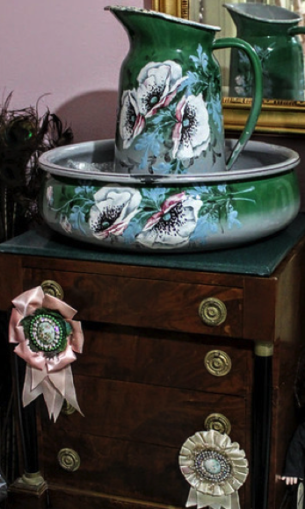
Vintage enamelware, Jean L. – Licence CC BY-SA 2.0
Hull in the 1950s was a very different place to the North London suburb of Finchley were we lived. We lived in a large 4 bedroom semi with front, rear and side gardens in a quiet tree-lined street with a large park at the end of the road. We had hot and cold running water, central heating, two WCs and a proper bathroom. Our annual two weeks in Hull was an adventure. There were still bomb sites, cobbled streets and many people bought sterilised milk which I had never seen in Finchley. It was only years later that I realised that sterilised milk kept for ages if unopened and didn’t need a refrigerator, which were a rarity in 1950s Hull.
On the east side of the Fountain Road house was another house and then an entry to what had been a stable yard, then a few more houses before a large flat fenced off area. Over the years Great Granddad and then Grandad had rented space in the stable yard for their horse and cart which they had used for the family fish and ice merchant business. Grandad had graduated to a lorry years before I was born but it too had still been kept in Huson’s yard. Now Grandad was retired, Uncle Harry kept his car there. The flat area had been houses that had been destroyed by a bomb in WW2. The bomb had also destroyed the rear of a cinema that stood on Beverley Road. The front wall of the cinema was still there. The flat area was used by British Rail as a compound to park their lorries.
To the west side of my Grandparent’s house was Gladstone’s fishmonger’s shop. He had a huge fridge to keep the fish in and he used to keep Grandma’s milk in it for her. Many’s the time I had to go and fetch another pint from “Gladdy” as everyone called Mr Gladstone. A few more houses down was Mrs Knowles corner shop. A good old fashioned corner shop that sold everything from sweets to buckets, bread to tinned soup. I think Arkwright’s in “Open All Hours” was based on a similar shop.
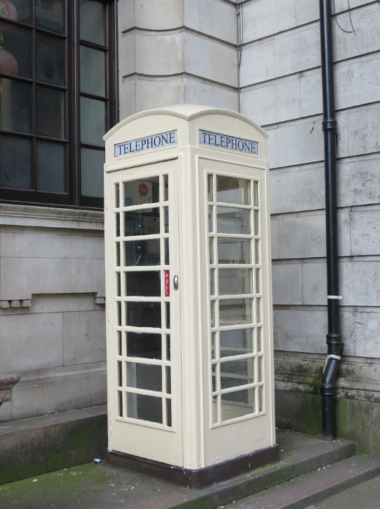
Hull, Alex Liivet – Licence CC BY-SA 2.0
Hull had its own corporation telephone service with cream coloured phone boxes. It had wired television and radio distributed by Rediffusion, which was why Grandad sat in the corner, it was next to the wall-mounted channel switch. Hull had blue and white corporation trolleybuses with separate entrances and exits and two staircases. It even had dome roofed Beverley Bar buses run by East Yorkshire Motor Services. These buses were especially adapted to pass through the domed arch of the Beverley North Bar, the 15th Century, Grade 1, listed gate to the city.

North Bar Within – Beverley, Summonedbyfells – Licence CC BY-SA 2.0
Staying in Hull, on fine days we would often get the train to the beach at Hornsea. On days that weren’t as good, we took the No. 63 trolley bus into the city centre to wander round the shops or go to the cinema. Some days we would walk from the town centre past Prince’s Dock and Humber Dock to the Victoria Pier to watch the ferry to New Holland and the boats on the Humber. We would usually walk back a different way and try to include the wonderfully named street “Land of Green Ginger” in our walk. On those sunny days, we would walk up to Stepney Station and get the train to Hornsea. Back in the fifties, this line was still steam hauled. The trains ran out of Hull Paragon and looped around to Stepney and then on to Wilmington station where the line split, one branch went to Hornsea and the other branch was the goods service to the Victoria Docks and passenger service to Withernsea.
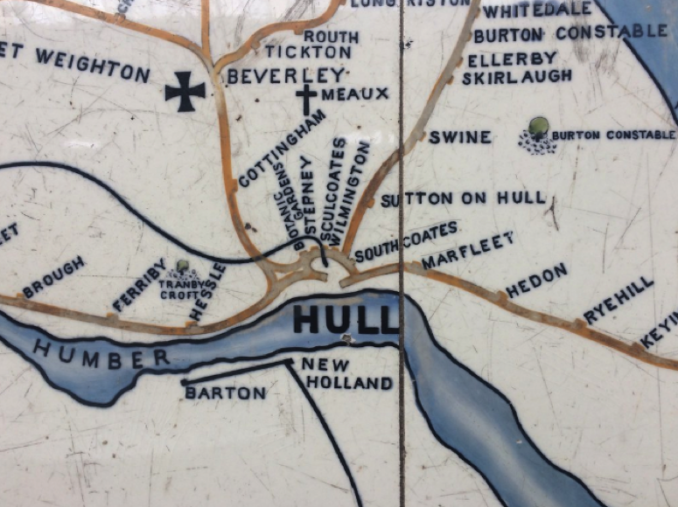
Hull railway map, Yellow Book – Licence CC BY-SA 2.0
Stepney Station was on Beverley Road and there was a level crossing to hold up the busy road. Buying railway tickets at Stepney was always a bit hit and miss. There was a ticket office on the Hornsea/Withernsea platform, but you never knew if it was going to be open. Still, you could usually buy a ticket from the guard or pay at your destination. I can well remember standing on the platform waiting for the locomotive to come to a hissing halt at the platform end next to the level crossing. The train took you through a number of exotically named East Riding village stations such as Skirlaugh, Swine, Ellerby and Sigglesthorne where nobody ever seemed to get on or off. When it got to Hornsea Bridge station a number of men with fishing rods always alighted, as it was the station for Hornsea Mere the largest freshwater lake in Yorkshire. The next station was Hornsea Town the terminal, so Hornsea Bridge was also the clue to get the bag of lunchtime refreshments and buckets & spades down from the old fashioned net luggage rack.
Hornsea Town had one long single-sided covered platform and an uncovered equally long island platform, known as the excursion platform. When the steam hauled train pulled up at the main platform the locomotive was at the wrong end of the train for the return journey. At many stations, the engine would have been switched to one of the other tracks, reversed to the other end of the train and hooked up to run backwards on the return trip. Not so at Hornsea. At the head of the platform was a level crossing and the other side of the crossing were sidings with a turntable, hence the engine could be turned to face the correct way for the return journey. The excursion platform was occasionally used for bank holiday specials from York or Leeds.
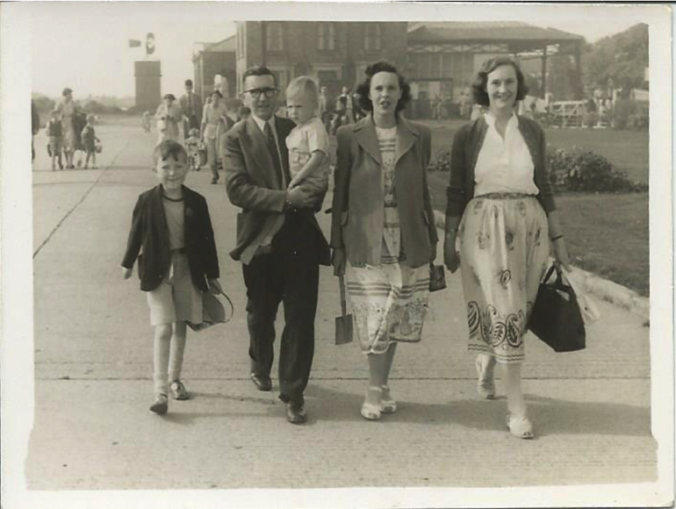
© WorthingGooner, Going Postal 2020
The sea was only a couple of hundred yards from the station. A walk down a wide concrete path took you on to the promenade. If you turned right along the prom after a couple of hundred yards you came to a shallow concrete pool that housed the motorboats for hire. We normally turned right and walked along the prom until we got to a less busy part of the beach (most day-trippers stayed near the station). Our normal spot was near the Floral Hall cafe and close to the hut that sold Eldorado ice cream. There were several ice cream huts along the prom built on stilts from the beach bringing the huts to prom level. Walls, Lyons, but there was only one Eldorado outlet, in fact I don’t think I ever saw another one anywhere else, but I did hear it was taken over by Lyons. Built into the prom was a sort of cave from which you could hire Hornsea UDC deck chairs and windbreaks. Mum and Dad always hired deckchairs, my brother and myself always had to sit on towels spread on the sand. If it was windy, and it nearly always was, we also had a windbreak. At lunchtime out would come the flask of tea and the egg sandwiches. I have an abiding memory of the wind whipping up the sand and eating gritty egg sandwiches. In the afternoon we would have an Eldorado ice cream, invariably Mum had a choc-ice, Dad had a wafer and my brother and I had a cornet. The cornets took the same paper wrapped block of ice cream as a wafer.
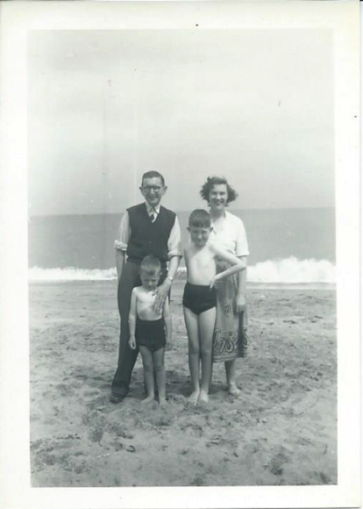
© WorthingGooner, 2020
One of my Grandad’s sisters lived and worked in Hornsea and on her days off she would come and search us out on the beach. My brother and I were always embarrassed as she stood on the prom calling to us at the top of her voice. Dad also hated it as he had to give up his deckchair. One day every holiday, usually bank holiday Monday (the 1st August Monday until 1965) we would have a family day on the beach. My Dad’s sister, her husband and cousins, my Granddad’s brother’s and sisters and their children and various other more distant relatives all gathered for what was often the only family get together of the year. I remember fun family days full of beach football, beach cricket, a huge picnic and swimming in what always seemed to be a freezing cold North Sea.
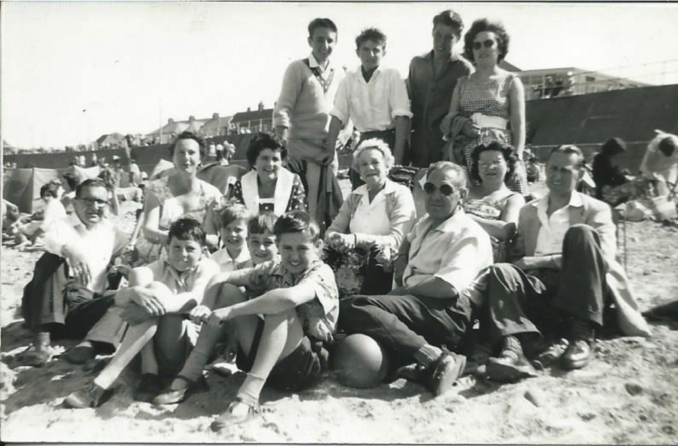
© WorthingGooner, 2020
Grandad died on Good Friday 1957, but we still went to Grandma’s every summer. However, in the mid-1960s Fountain Road was redeveloped and Grandma was given a council flat on the Bramsholme Estate which she hated. Within a year she had gone to live with her daughter in a village on the outskirts of Goole where she died in 1972. I think the last time I went to stay in Hull was probably about 1964 when Dad got a new job working as the credit controller for a major London auction house. The new company owned a flat in Swanage, Dorset and employees in senior positions could use the flat, free of charge, for a couple of weeks each year. But that’s another story.
©️ WorthingGooner 2020
The Goodnight Vienna Audio file
Audio Player

